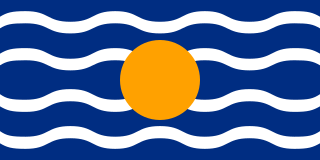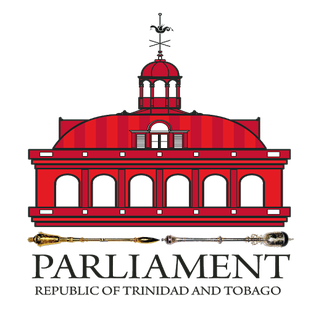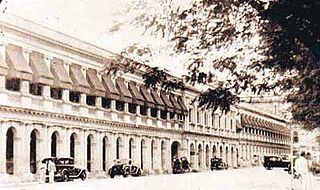
The politics of Trinidad and Tobago function within the framework of a unitary state regulated by a parliamentary democracy modelled on that of the United Kingdom of Great Britain and Northern Ireland, from which the country gained its independence in 1962. Under the 1976 republican Constitution, the monarch was replaced as head of state by a President chosen by an electoral college composed of the members of the bicameral Parliament, consisting of the Senate and the House of Representatives.

The House of Representatives is the lower house of the bicameral Parliament of Australia, the upper house being the Senate. Its composition and powers are set down in Chapter I of the Constitution of Australia.
A member of parliament (MP) is the representative in parliament of the people who live in their electoral district. Members of parliament typically form parliamentary groups, sometimes called caucuses, with members of the same political party. Many countries with bicameral parliaments, this term refers only to members of the lower house since upper house members often have a different title. The terms congressman/congresswoman or deputy are equivalent terms used in other jurisdictions. The term parliamentarian is also sometimes used for members of parliament, but this may also be used to refer to unelected government officials with specific roles in a parliament and other expert advisers on parliamentary procedure such as the Senate parliamentarian in the United States. The term is aMembers of parliament typically form parliamentary groups, sometimes called caucuses, with members of the same political party.lso used to the characteristic of performing the duties of a member of a legislature, for example: "The two party leaders often disagreed on issues, but both were excellent parliamentarians and cooperated to get many good things done."

The Senate of Canada is the upper house of the Parliament of Canada. Together with the Crown and the House of Commons, they compose the bicameral legislature of Canada.

The Australian Senate is the upper house of the bicameral Parliament of Australia, the lower house being the House of Representatives.
Bicameralism is a type of legislature that is divided into two separate assemblies, chambers, or houses, known as a bicameral legislature. Bicameralism is distinguished from unicameralism, in which all members deliberate and vote as a single group. As of 2022, roughly 40% of the world's national legislatures are bicameral, while unicameralism represents 60% nationally and much more at the subnational level.

The West Indies Federation, also known as the West Indies, the Federation of the West Indies or the West Indian Federation, was a short-lived political union that existed from 3 January 1958 to 31 May 1962. Various islands in the Caribbean that were part of the British Empire, including Trinidad and Tobago, Barbados, Jamaica, and those on the Leeward and Windward Islands, came together to form the Federation, with its capital in Port of Spain, Trinidad and Tobago. The expressed intention of the Federation was to create a political unit that would become independent from Britain as a single state — possibly similar to Canada, the Federation of Australia, or the Federation of Rhodesia and Nyasaland. Before that could happen, the Federation collapsed due to internal political conflicts over how it would be governed or function viably. The formation of a West Indian Federation was encouraged by the United Kingdom, but also requested by pan-Caribbean nationalists.

President of the Senate is a title often given to the presiding officer of a senate. It corresponds to the speaker in some other assemblies.

The Parliament of Australia is the federal legislature of Australia. It consists of three elements: the monarch of Australia, the Senate, and the House of Representatives. It combines elements from the Westminster system, in which the party or coalition with a majority in the lower house is entitled to form a government, and the United States Congress, which affords equal representation to each of the states, and scrutinises legislation before it can be signed into law.

The president of the Republic of Trinidad and Tobago is the head of state of Trinidad and Tobago and the commander-in-chief of the Trinidad and Tobago Defence Force. The office was established when the country became a republic in 1976, before which the head of state was the Queen of Trinidad and Tobago, Elizabeth II. The last governor-general, Sir Ellis Clarke, was sworn in as the first president on 1 August 1976 under a transitional arrangement. He was formally chosen as president by an electoral college consisting of members of both houses of Parliament on 24 September 1976, which is now celebrated as Republic Day.

The Federation Council, unofficially Senate, is the upper house of the Federal Assembly of Russia, the lower house being the State Duma. It was established by the Constitution of the Russian Federation in 1993.

Trinidad and Tobago elects its House of Representatives on the national level. The head of government, the prime minister, is chosen from among the elected representatives on the basis of his or her command of the support of the majority of legislators. The Parliament of the Republic of Trinidad and Tobago has two chambers. The House of Representatives has 41 members, elected for a maximum five-year term in single-seat constituencies. The Senate has 31 members: 16 government senators appointed on the advice of the prime minister, six opposition senators appointed on the advice of the leader of the opposition and nine so-called independent senators appointed by the president to represent other sectors of civil society. The president is elected for a five-year term by an electoral college consisting of the members of both houses of Parliament. Other elected bodies include the local government bodies in Trinidad and the Tobago House of Assembly, which handles local government in the island of Tobago and is entrenched in the constitution.

The Parliament of Trinidad and Tobago is the legislative branch of Trinidad and Tobago. The Parliament is bicameral. Besides the President of Trinidad and Tobago, it is composed of the House of Representatives, which is composed of the Speaker of the House of Representatives in addition to 41 directly elected members serving a five-year term in single-seat constituencies, and the Senate which has 31 members appointed by the President: 16 Government Senators appointed on the advice of the Prime Minister, 6 Opposition Senators appointed on the advice of the Leader of the Opposition and 9 Independent Senators appointed by the President to represent other sectors of civil society. It is at present the only parliament in the world with an incumbent female President, President of the Senate, Speaker of the House of Representatives and Leader of the Opposition and made history by appointing the Caribbean's first and only transgender parliamentarian on 15 February 2022. As of 20 April 2021, there are only 24 female members, or 32.9% and eight members born in Tobago or 11.0%.

The Senate of Trinidad and Tobago is the appointed upper house of the bicameral Parliament of Trinidad and Tobago, along with the President and House of Representatives of Trinidad and Tobago. The Senate currently sits at the Red House. The Senate has 31 members all appointed by the President: 16 Government Senators appointed on the advice of the Prime Minister, 6 Opposition Senators appointed on the advice of the Leader of the Opposition and 9 Independent Senators appointed on the discretion of the President from outstanding persons who represent other sectors of civil society. The presiding officer, the President of the Senate, is elected from among the Senators who are not Ministers or Parliamentary Secretaries. A senator must be at least 25 years old and a citizen of Trinidad and Tobago. The current President of the Senate is Senator Nigel de Freitas. As of 20 April 2021, there are only 13 female senators, or 41.9% and 6 Tobagonian senators or 19.4%. The Senate made history on 15 February 2022 by appointing Jowelle de Souza as an acting opposition senator, thus making her the Caribbean's first and only transgender parliamentarian.
The Senate was the upper house of the Parliament of South Africa between 1910 and its abolition from 1 January 1981, and between 1994 and 1997.

The Senate was the upper chamber of the parliament of Ceylon established in 1947 by the Soulbury Commission. The Senate was appointed and indirectly elected rather than directly elected. It was housed in the old Legislative Council building in Colombo Fort and met for the first time on 12 November 1947. The Senate was abolished on 2 October 1971 by the eighth amendment to the Soulbury Constitution, prior to the adoption of the new Republican Constitution of Sri Lanka on 22 May 1972. In 2010 there were proposals to reintroduce the Senate.

Keith Christopher Rowley, is a Trinidadian politician serving as the seventh prime minister of Trinidad and Tobago, first elected into office on 9 September 2015 and again following the 2020 general election. He has led the People's National Movement (PNM) since May 2010 and was Leader of the Opposition from 2010 to 2015. He has also served as the Member of the House of Representatives for Diego Martin West since 1991. He is a volcanologist by profession, holding a doctorate in geology, specializing in geochemistry.

Elizabeth II was Queen of Trinidad and Tobago from the independence of Trinidad and Tobago on 31 August 1962 until the country became a republic on 1 August 1976. Her constitutional role as head of state was delegated to a governor-general, who acted on the advice of government ministers.

Federal elections were held in the West Indies Federation for the first and only time on 25 March 1958. The result was a victory for the West Indies Federal Labour Party, which won 25 of the 45 seats in the House of Representatives.

The Tobago Council of the People's National Movement, also known as the Tobago Council of the PNM, PNM Tobago or PNM Tobago Council, is the longest-serving and oldest active political party in Tobago. The party is the autonomous branch of the Trinidad and Tobago People's National Movement operating in Tobago. While its political leader acts in the local capacity, they also serve as a deputy leader on a national level. The party's executives organize for both local and national election campaigns. There have been three PNM Chief Secretaries and administrations.













